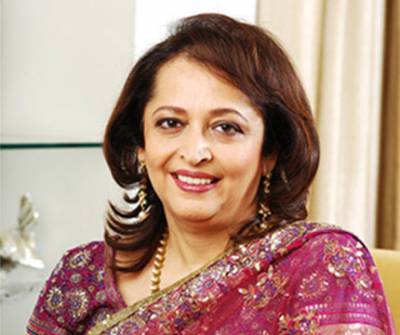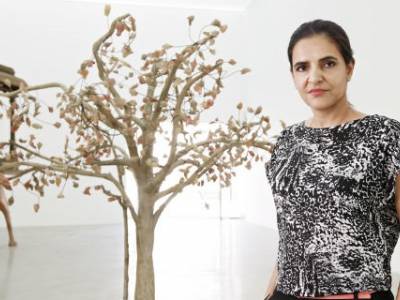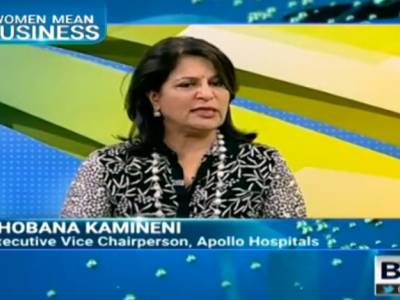Women Mean Business: I’ve failed many times in my career - Swati Piramal
The gender divide is fast dissipating in every sphere of business. There are several women business leaders today, leading from the front and inspiring an entire generation of young women to take up the mantle of leadership.
English Business News Channel BTVi - Business Television India has endeavoured to bring women thought leaders under one platform, celebrating their success stories, thereby motivating the millennial with their show, ‘Women Mean Business’. The second season of the show went on air on June 17, 2017 and airs every Saturday @ 8pm on the channel. The guests on the show this season will range from Media baron to Renowned Restaurateur, from award winning Gemologist and Jewellery Designer to Globally acclaimed artist.
Not only is Dr Swati A Piramal a successful industrialist, she is also a scientist of note and a pioneer in the area of intellectual property. As Vice Chairperson of Piramal Enterprises, Dr Piramal has used her background in medicine, public health and business to change the trajectory of healthcare, education, and public policy in India.
To watch full video click here.
Dr Piramal was conferred with the Padma Shri award in 2012. She has been nominated eight times as 25 Most Powerful Women, and is now a part of the Hall of Fame of Most Powerful Women. She had served as the first woman president of India’s Apex Chamber of Commerce in 90 years. She also served as an advisor to the Indian Prime Minister in science, technology and economic policy (2006-2014).
Dr Piramal is an alumnus of the Harvard School of Public Health. Education on Woman Empowerment & Health in the rural Indian sector is an intricate part of her life.
How will you define innovation as well as disruption?
Innovation is a part of the values of our group. We define innovation as doing things creatively and getting the work done in a unique way – whether it is in science or in everyday life.
I have used innovation particularly in the area of science, where I was a pioneer in the area of intellectual property. Very early in my career I used to believe that intellectual property and filing patterns is that right way to go, but at that time the mindset in India was completely different. They wanted more about copying, more about low cost and getting things done in a very non-protective way for the inventor. That does not help innovation research into India’s problems.
Very early on in my career I pioneered the idea of filing patents and I have a few to my name as well. We have 250 patents in the company. These are unique, when you file a patent, you get approval from the US, Europe, Japan, India and that is the creative bent of mind I try to use in everything I do.
What was your inflection point?
For me it was when I was 37 years old with 2 children. I went to Harvard for my post graduate degree in public health. The one thing you feel at Harvard is that there are people from all over the world, it opens your mind to new ideas, new ways of doing things, new technology and this constant quest for excellence, perfection, innovation and new technology took root at Harvard. Very soon after I came back, I started my own research centre with over 500 scientists looking at and discovering new drugs. In my life, it was this moment which opened new vistas worldwide.
Please tell us about your memories from Harvard.
Harvard was a life changing experience for me and I had taken both my children there and I hoped one day they would imbibe this idea of work, culture and education, which later on they did. As a student I had no idea that they would make me a member of the board of overseas people of the university. I was told that there would be an election for it. They also told me that nobody from India had ever won and I, too, was most likely to lose. When I wanted to know who all had lost these elections before me, I was shocked to know that ex-US President Barack Obama and Robert Kennedy had lost when they stood for the same elections. However, I still stood for the elections and it was a great surprise to me when I won.
It has been an amazing experience. It’s a 6-year term and I go there 6 times a year. What I feel the most when we go there is that convening spirit of knowledge and that is one of the values on which we drive our group – we constantly look at acquiring expertise and knowledge so that it can permeate every person who works for us.
Where would you say we are in the curve of innovation as well as the importance that is being given to research and innovation in India?
I have both good and bad news. The good news is that Indians are constantly innovating, whether in business or science, and indeed some of the scientists who have left the country are doing seminal work in universities worldwide.
The bad news is that the landscape of Indian innovation and R&D is still not where it should be. We still have a mindset of low cost generics without understanding that you need research funds to look into India’s problems. Take the example of malaria or tuberculosis, where the drugs don’t work. The kind of cancer that we see in India is very different from the west. Who is going to solve these problems? It is only Indian scientists and Indian companies, however, that push isn’t as strong as I would like it to be.
But the landscape is changing rapidly and hopefully the new government with Prime Minister Narendra Modi really puts in efforts towards innovation and science more than ever before.
How has the Piramal Group evolved and diversified, and what is the strategy that you have employed? Also, what role has technology played when it comes to these different expansions?
The Piramal Group has grown a lot since we started. We moved from textiles to pharmaceuticals and from pharmaceuticals into other areas as well, including financial services, big data management and also real estate. But obviously in each of these businesses, I feel technology is at an inflection point today. Everything is changing and technology is no longer what one was really good at and continue doing the same. There is so much change and disruption that one has to not just be good at one industry, but be more than that. Just like Tesla came up with not just automotive engineering, but rocket science, big data, computers. Earlier, there were no electric vehicles, renewable energy, driverless cars – those are the new landscapes. As a leader, we have to understand that we can no longer be a specialist in one thing. We have to absorb and know more about many diverse industries and diverse sciences.
Being a scientist, business person and a problem solver, what are your greatest challenges?
My fascination recently has been looking into real world problems. We have surely done very well in our business, but in the end has it reached the people on the farthest post?
Look at breast cancer in the North East, forget about detecting it, there are no hospitals. Let’s say, if I start a screening service in remote areas of Assam, what would I do after I detect the cancer? Will I take them 600 miles to the nearest city? And what if there are no required equipment and I detect it wrong? Here, I am setting out to do something good, but I am also grappling with issues like the technology, the cost and the logistics of getting people to a place where they can be taken care of. These are what I call real world issues and not something to do with making a product and manufacturing it as per US FDA standards and selling it worldwide; these are a different set of challenges. And this is the one which is fascinating me much more now – how to get healthcare to the remotest parts of our country, to every woman and child who needs it.
Are there any organisations or institutions that you admire and countries you feel have been successful in coming up with solutions that India can benefit from? How much of an enabler is technology in this case?
Recently, our group won at The Financial Times contest, which had exactly to do with looking at companies worldwide who solve real issues and challenges of the world. We put our name for the clean water programme, which we call ‘Sarvajal’, and while I was waiting to see who would win so that I could learn from them, to my surprise they gave us the award. The judge was from Africa and she said that this kind of technology is useful even for Africa.
We have no right to keep the technology to ourselves. We must circulate to whoever needs it.
In what way you actually look at the problems, whether it’s an everyday issue or something as large as global diseases?
This year we have added an idea of impact to our three values of knowledge, action and care. We also added an interesting word called ‘resilience’, which means getting things done with courage and facing challenges on the way. When I reflect back on our group starting in textiles, overcoming two World Wars, plague for 100 years before, we survived all that. Later, we had a fire and the whole factory got burnt down, but we bounced back.
When I look back at the 40 years of my career, I found this word ‘resilience’ keeps coming back again and again. Very often I tell young people that life is like a runway, where you want to take off and fly and want to land on target, but there is a runway time that you need to give to something you are doing. There will be challenges, there will be wind, rain and snow during your take-off, which you will need to overcome. Everyone faces it and needs to have that resilience and positive feeling and the ability to bounce back from every trouble. And I think that’s really been a part of our history and that is something that I would like to teach people who I mentor – that it’s not going to come in a day, it will take time and great effort and challenges. Overcoming them is really the key to success.
Do you think the culture of failure is highlighted enough in India?
I have failed so many times in my career. Once I thought that aside from science l would start a restaurant. We had started the Crossroads Mall, which was the first mall in India. There was an Italian restaurant, but after six months I gave up on that too. We closed the Discovery Research Programme a few years ago because the regulatory landscape in India completely changed towards clinical trials and that’s the reason why we moved it to Germany and other countries. Actually, I wrote a poem to all my scientists that, yes we are closing this part of our research, but we are opening others and I am writing this poem because I feel that we all worked together and had an idea of India and innovation, but at some point I feel sorry because it didn’t succeed. According to me, in science success comes from failure of your previous scientific work and that’s the way science is built. In science you won’t completely succeed in the beginning, but you have to keep on trying, as Einstein said: “Hundred times you discover that one thing” and Thomas Edison must have tried hundred times before the light bulb was born. These are some great things about science and I never feel sorry for my failures in my career.
Have you ever doubted yourself?
Since I was a pioneer in intellectual property, the whole world told me that I was completely wrong. In India, they threw me out of an association of pharmaceutical companies because I had completely different views from others. It took 10 years before they changed their minds too and everybody started believing in innovations. When we moved to pharmaceutical in 1988, everyone was exiting the business; there were at least 10 multinationals who sold their businesses one by one. Not only did we enter the business, we actually tripled our investments with big plans and it was a contrarian approach. Of course, we had our doubts as everybody was selling out their businesses. But for us, it has always been this idea that finds the right spot by looking nowhere else.
To watch full video click here.














Share
Facebook
YouTube
Tweet
Twitter
LinkedIn